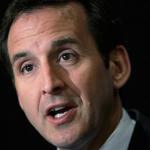What Have They Done to Tim Pawlenty?
 In an address to AIPAC, Tim Pawlenty argued that America cannot rely on deficit spending and still secure its foreign policy objectives. Could his comments mark the beginning of a conservative departure from the Reagan foreign policy paradigm?
In an address to AIPAC, Tim Pawlenty argued that America cannot rely on deficit spending and still secure its foreign policy objectives. Could his comments mark the beginning of a conservative departure from the Reagan foreign policy paradigm?
Could Pawlenty’s remarks last night to a room full of AIPAC activists mark the beginning of a conservative departure from the Reagan foreign policy paradigm?
At first glance this would seem preposterous. Pawlenty alludes repeatedly to Reagan’s combination of pressure and engagement, and explicitly defines regimes and dictators who are enemies of freedom and democracy. In this sense there is no deviation. However, Pawlenty briefly expounds upon the way in which the U.S.’s budgetary woes are infringing upon our freedom of action:
But we should also realize that now more than ever, our national security is imperiled by America’s out of control spending. We do not have much leverage over places that prop up our economy by buying our debt. These issues are related and we must as a nation face these difficult facts.
Difficult indeed. These comments signal a major departure from Reagan-era policy that relied on running major budget deficits, in the shape of military spending, to apply the “pressure” side of the U.S.’s relationship with the Soviet Union. Pawlenty touched upon the fact that America cannot for much longer rely on deficit spending (of any kind) and still secure its foreign policy objectives, indeed it already must be wary of biting the hand that feeds it. Pawlenty’s platform then seems to recognize the passing of the paradigm that brought us the dissolution of the Soviet Union, and was employed during the second Bush administration (think Cheney’s claim that “Reagan taught us that deficits don’t matter.”), and alludes to a new era that will focus on fiscal responsibility as the means by which to achieve national security initiatives.
Moving forward Pawlenty’s platform may look like this: fiscal responsibility in the form of budget balancing amendments and policies as the foundation on which to build domestic reform initiatives and ensure freedom of action on national security objectives. Conservatives, for some thirty years now have not adhered in any way to the second part of this paradigm, and even diverged from the former part during the last GOP administration. This type of platform is a recognition of the revolution currently underway in the conservative movement, where ground zero for protecting freedom and democracy is now centered within our own borders. In practice, such a platform would see American power shrink in the short term as it tackled the looming entitlement crisis, and then recover as it gained the ability to self-finance its military and other security objectives.
This new paradigm has yet to be explicitly defined, and perhaps Pawlenty himself is not entirely aware of the magnitude of the divergence he is alluding to here. But it is increasingly clear that the methods of the Reagan era, the actual mechanics of it, will no longer yield satisfactory returns. The question now is if conservatives will accept a new direction that reconciles their desire for a strong U.S. foreign policy with strong fiscal responsibility, two goals that have been and for now continue to be wildly divergent. If they are willing, the result will be the most significant rethinking of foreign policy by the GOP in some 40 years.